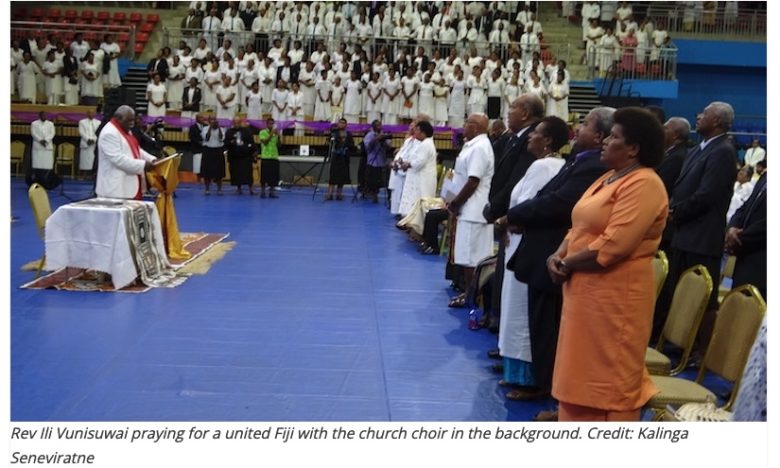FIJI, May 16, 2023 (Eurasia Review.com by Kalinga Seneviratne): In an emotionally charged “Reconciliation and Thanksgiving” service organized by Fiji’s Methodist Church—the country’s largest Christian denomination—the President of the church Reverend Ili Vunisuwai and Prime Minister Sitiveni Rabuka apologized to the Indo-Fijian community for the suffering and insults they have endured in Fiji’s post- independence-era, paving the way to what the political leaders here call “building a new era” of peace and prosperity.
The South Pacific nation of Fiji Islands that has a population of close to 925,000 and about one-third of them of Indian descent brought here during an era of human trafficking by the British between 1879 and 1916 to work in the sugar cane plantations they were establishing. According to official records, 60,553 were shipped to Fiji from India and they are today known as Girmitiyas, which is a reference to the unfair agreement they had to sign with the British plantation owners after arriving in Fiji as indentured (bonded) labor for five years. After five years of work in the cane fields, the British freed the Girmits from bonded labor but did not offer them a passage back. So, most of them stayed back and by the mid-1980s their descendants through hard work and education have made a mark in Fiji dominating business and professional fields.
By this time Indo-Fijians made up 49% of the population but indigenous Fijians controlled land ownership. In April 1987, for the first time since independence in 1970, Fiji elected a multi-ethnic Fiji Labour Party to power supported mainly by Indo-Fijian voters but led by indigenous Fijian academic Dr Timoci Bavadra. Most of the Cabinet however were Indo-Fijians. On 14 May 1987, 39-year-old Lieutenant Colonel Sitiveni Rabuka, then third in command of the Royal Fiji Military Forces stormed the parliament, ordered the MPs to vacate the building and forced the Governor General (GG) to elect him as the country’s leader. In September, the same year he staged another coup when he felt the GG (as Queen’s representative) was undermining his rule by trying to impose a coalition government, and a month later he declared Fiji a Republic.
The same Rubuka, who staged the coups in 1987 to protect indigenous Fijian interests that forced thousands of Indo-Fijians—especially professionals—to emigrate overseas thus bringing down the Indo-Fijian component of the population to about 35% now, announced in February this year that May 15th will be a national holiday each year to mark “Girmit Day” to pay homage to the Girmitiyas who helped to build modern Fiji. On Sunday (May 14th), in an 8-minute speech, the same Rabuka—now 74—in an emotional speech told a stunned audience that what he did in 1987 was wrong. Making clear that he is not speaking on behalf of the government or the I-Taukei (indigenous) people, because they were not involved in the coup, he said he was speaking on behalf of himself, and the people involved in the coup.
The Methodist church in Fiji strongly supported the coups of 1987 and 2000, but now under a more moderate leadership, they have taken the lead to bring the Christian indigenous community and the predominantly Hindu Indo-Fijians together. The Sunday’s service was held at a large indoor stadium and included both the church choir and a choir that sang Hindu Bhajans. At the end of the service, Fiji’s leaders including the PM, Methodist church, past and present political leaders and community representatives signed the “Forward Fiji Declaration” vowing that “there will be no more coups and divisions,” and instead promote mutual understanding and respect to build the new Fiji.
More at source.
https://www.eurasiareview.com/16052023-after-historic-apology-fiji-moves-to-build-a-new-nation-oped/
A daily summary of world news for Hindus and non-Hindus alike

